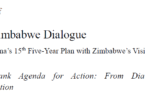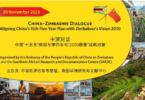by Munetsi Madakufamba
As Beijing hosts the 2024 Summit of the Forum on China Africa Cooperation (FOCAC), I continue to share my insights, from a southern African perspective, on the great diplomacy and intellectual project of our time. In this second in a series of articles on FOCAC 2024, I look at the significance of the China Africa cooperation framework, what it has achieved, and how Africa can leverage synergies for its development agenda.
Chinese President Xi Jinping is hosting African leaders in Beijing 4-6 September 2024 for the Forum on China-Africa Cooperation (FOCAC) amid high expectations of a partnership that is seen as a good example of a South-South cooperation framework that delivers.
In line with previous FOCAC meetings, China will present its vision for China-Africa relations for the next three years, this time under the theme, “Joining Hands to Advance Modernization and Build a High-Level China-Africa Community with a Shared Future”.
China’s expanding diplomatic footprint
Since FOCAC’s inception in 2000, the meeting started as a ministerial-level event, alternating between Beijing and Africa every three years. The Chinese president would attend the meetings in Beijing, while the premier attended FOCAC meetings in Africa. However, since Xi’s presidency, FOCAC meetings have been upgraded to summit level (2015 in Johannesburg and 2018 in Beijing). The exception was in 2021, in Dakar, Senegal, when the meeting was downgraded to ministerial level amid COVID 19 restrictions, although Xi still addressed the meeting virtually.
In the last 24 years, China’s growing diplomatic influence in Africa has been publicly exhibited through FOCAC. The American-led West has responded through all kinds of ways, including propaganda fallacies that China is leading “a new colonization of Africa”, or “China is plunging Africa into a new debt trap”. Nothing could be further from the truth. Africa knows what its priorities are.
There is no doubt that the shift in global geopolitics will have a greater influence on the outcome of FOCAC 2024. For example, the great power rivalry, that is the growing tension between China and the United States. Unfortunately, Africa is increasingly becoming the ground centre of this rivalry. Beyond solidarity, it becomes critical that FOCAC seeks common positions to cushion the continent from the inevitable effects of this big power competition.
FOCAC is more than just diplomacy
Apart from pursuing diplomacy and exploring shared common positions on pertinent global affairs, African leaders would want to use FOCAC as an opportunity to explore China in many different ways.
With China as the second largest world economy, African leaders would be interested in what concrete funding commitments can be secured to finance development in many critical areas including agriculture, infrastructure, industrialization, digital economy and green development which are high on the agenda, especially for the Southern African Development Community (SADC).
African leaders will also be interested in learning about China’s development and modernization experience, and how that can be applied back home based on each one’s unique circumstances and priorities.
“Africa-plus-one” cynicism
Questions have been asked about the significance of the many “Africa-plus-one” arrangements developed with major economies both in the Global North and the Global South. Africa now has partnership frameworks with countries spanning from the US, France, Japan, to Indonesia and South Korea. However, there has been growing cynicism about what comes out of these cooperation frameworks, and also why 54 countries (that make up Africa) all have to be “summoned” by one leader. Although Paris and Tokyo were some of the pioneers of the concept, many are now increasingly leaning towards the Beijing model.
FOCAC is different in many ways. First, the development approach and cooperation between China and Africa is based on mutual benefit, most importantly as there is a shared understanding of each other’s context, circumstances, and development priorities. The development experience of Africa with the West has been based largely on a kind of relationship of one side exploiting the other, which is unbalanced development.
Second, although funding is very much an important part of China Africa relations, FOCAC was not framed on the prism of aid. It has been fast-tracked to the leadership level, and combines small community investments with much visible cross-country, and in some cases cross-regional, large-scale infrastructure projects. The citizens can see and live the experience at grassroots level. This magnitude of unimaginable success has inspired others to follow.
Third, while FOCAC hosts African countries en masse, it has never lost sight of the fact that “Africa is not one country”. This has been the folly of some of the other country arrangements, who have failed to read Africa’s complexity by treating the continent as a monolithic partner.
The big number question
At the 2015 FOCAC Summit in Johannesburg and 2018 in Beijing, China pledged USD60 billion at each meeting in aid and loans for development in Africa. This money has gone into areas spanning agriculture, the digital economy, green development, industrialisation, infrastructure development, and peace and security, sparking an unstoppable momentum of rapid growth on the continent.
At the 8th Ministerial FOCAC held in Senegal in November 2021, China announced, a reduced pledge of USD40 billion amid the profound changes presented by COVID 19. It was also not surprising that the meeting was downgraded to ministerial level given the circumstances of the time. Among other areas, China would provide USD10 billion of trade finance to support African exports, and an equal amount to undertake 10 industrialization and employment promotion projects for the continent, particularly through the development of small and medium-sized enterprises.
Africa is rising
In May 2000, The Economist once ran an infamous headline that described Africa as “a hopeless continent”, a perspective that was shared by many in the West then as it is now, although it may not be publicly stated. In contrast, China has always seen Africa as a continent full of hope and vibrancy, and unsurprisingly treats African countries as equal partners.
There is no better time for Africa to embark on the journey of modernization than through the opportunity presented by China-Africa cooperation, a partnership based on mutual respect, equality, trust and joint consultation. FOCAC presents a fresh South-South cooperation partnership that is mutually beneficial and has shifted from the traditional political friendship to encompass economic diplomacy, making it an all-round and profound cooperation.
An intellectual fete
In addition to its policy thrust, FOCAC is also seen as an intellectual celebration of two synergic civilizations. I was one of the speakers at the 6th Forum on China-Africa Media and the China-Africa Think Tank High-Level Dialogue convened in Beijing on 20-22 August 2024. Under discussion was China’s modernization experience and its underpinning philosophy, and how this can be infused with Africa’s own context.
China’s modernization experience is predicated on the Confucian philosophy, which is an idea that says there is “a basic order in the universe and a natural harmony” between people and nature.
On the African side is the Ubuntu philosophical thought, which is about interconnectedness between people, shared values, and its emphasis is on the common good, building peace through tolerance and reaching consensus through talking to one another.
Confucianism and Ubuntuism are therefore the two complementary philosophies on which China-Africa cooperation is founded. As the Chinese Foreign Ministry says, FOCAC is based on the ethos of “equal consultation, enhancing understanding, strengthening friendship and promoting cooperation”.
China-Africa cooperation is not about the “clash of civilizations” narrative of the West. Confucian and Ubuntu philosophies are therefore the intellectual motivation behind the 2024 FOCAC theme: “Joining Hands to Advance Modernization and Build a High-Level China-Africa Community with a Shared Future”.
The 2024 FOCAC in Beijing is, in many ways, the gathering of the “big China-Africa family” that is seeking “a shared prosperity” pursuant to what has become President E.D. Mnangagwa’s mantra: “leaving no one and no place behind”.
———————————————————————–—————————–
Munetsi Madakufamba is Executive Director of the Southern African Research and Documentation Centre (SARDC), a leading Zimbabwe-based think tank and regional knowledge resource centre dedicated to policy research and analysis in a range of relevant subject areas, informing development, and contributing ideas and practical solutions to Africa’s challenges. Offering a southern African perspective through specialist institutes, SARDC is a well-respected policy research centre on China-Africa relations. SARDC works with the Southern African Development Community (SADC) Secretariat and Member State governments, sub-regional organizations, international organizations, and other research networks, to undertake research that informs development.





